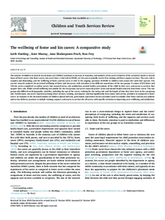Abstract
The number of children in need of out-of-home care (OOHC) continues to increase in Australia, and numbers of kin carers (relatives of the cared-for) match or exceed those of foster carers. Like foster carers, kin carers have a vital role in OOHC, yet kin carers typically receive less training and fewer support services. The carer role is complex and demanding, and the wellbeing of foster and kin carers is vital to the ongoing provision of OOHC to children who cannot live with their parents. The current research explores the perceived wellbeing of foster and kin carers, with attention to the different experiences of the two groups. A cohort of 210 foster and 116 kin carers completed an online survey that assessed stress, role satisfaction, mental health, perceptions of the child in their care, and access to services that support their role. While overall wellbeing was similar for the two groups, kin carers reported greater stress and mental health concerns than foster carers. The two groups also differed on demographic variables, including the age of the carers, training for the caring role and the length of time they have been in the caregiving role. Furthermore, kin carers reported accessing fewer services, training, and support; and had significantly less contact with service providers as compared to foster carers. In response to the increased number of children placed with kin, government and private service providers need to consider their foster and kin care policies and service delivery practices to include training, support, and access to services for all carers, with specific attention to improving carer wellbeing and satisfaction.
View the article here.

